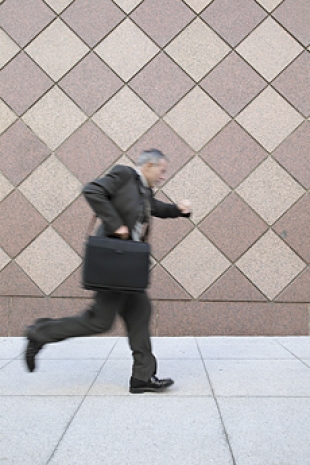In his book Addicted to Hurry: Spiritual Strategies for Slowing Down, Kirk Byron Jones contends that speed is accepted as the regulating ideal of American life. People are so anxious to get on with whatever they have to do that they have no time for relationships and community. This is reason for concern, says Jones, who teaches ethics and pastoral ministry at Andover Newton Theological Seminary, Newton Centre, Massachusetts: "When hurry becomes a chronic condition, when we run even when there is no reason to, when we rush while performing even the most mundane tasks, it may be said that we have become addicted to hurry."
This need for speed can diminish the quality of our lives and put a negative spin on patience, discernment, depth, joy, and dialogue. What lies behind this worship of the fast life?
Jones suggests we are running away from aches and fears, from ourselves, and from God. He presents some spiritual strategies for slowing down. At the heart of his anti-rushing alternative is the practice of savoring our experiences — slowing down to smell the roses. Jones spells out what this can mean in chapters on seeing more clearly, listening more carefully, and thinking more deeply.
Many other spiritual practices can help us not give in to hurry sickness. Slowness, a friend said, is like homeopathic medicine: if you take it in small doses every day, you will be happier and healthier.
Here are a few practices we have tried.
• Honor the Sabbath day and keep it holy by allowing it to unfold without any time limits to your activities. Enjoy a long conversation or a nap. Don't wear your watch or consult clocks.
• Stop multitasking. For example, don’t talk on the phone while you make dinner, walk down the street, or sit with someone. If you are watching television, just watch television.
• Try a day of silence. You will find that when you don’t speak, the pace of everything seems much slower and more deliberate. No wonder the mystics salute silence as a way into the presence of God.
• Resist the impulse to hit the "door close" button in elevators. (This button is usually the most worn on the elevator panel — a sure sign of our culture's addiction to speed.) This simple act of relaxation and nonaggressiveness could add immeasurably to the peace of the world.
• Instead of pushing your way briskly through crowds after a movie or when you are leaving a bus or plane, say "After you," and allow others to exit in front of you. This act of courtesy will calm your mind and encourage others to take their time, too.
• When you are tempted to say, "I'm a very busy person," say "I'm a very patient person" instead. See how this self-description affects the way you behave.
• Practice slowness by being slow to anger, slow to judge, and slow to write anyone or anything off. The best model for this intentional behavior is Jesus. Instead of immediately reacting to something or someone, put yourself on "pause" for several minutes.
• Thich Nhat Hanh, the Zen monk, has stated: "Life is so short, we should all move slowly." Go for a slow walk around your neighborhood.
• Notice what the Greeks called kairos, those moments when you let go of time and are totally absorbed in what you are doing. We usually describe such a peak experience as one “when time stood still."
• Finally, Thomas Keating, a Roman Catholic teacher of centering prayer, has said, "It only takes a moment for God to enrich you." Be open to this wonderful possibility. You don’t want to be moving so fast that you miss it!
